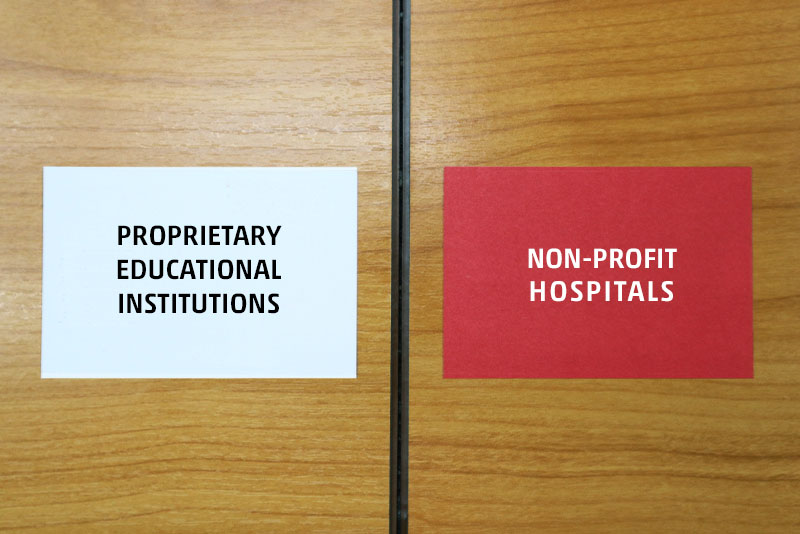Atty. Rodel Unciano discusses the coverage of the salient amendments to Section 27(B) of the Tax Code as implemented by RR 3-2022, which provides special tax treatment for proprietary educational institutions and hospitals which are non-profit.

Clarifying Taxability of Proprietary Educational Institutions
and Non-Profit Hospitals
By Atty Rodel C. Unciano
"The regular corporate income tax rate of twenty-five percent (25%) shall be imposed on the entire taxable income of the covered institutions if their gross income from unrelated trade, business, or other activity exceeds fifty percent (50%) of the total gross income they derived from all sources. On the other hand, a non-stock, non-profit educational institution shall be subject to the regular corporate income tax of twenty-five percent (25%) on the portion of its revenues or assets not used actually, directly, and exclusively for educational purposes."
The implementation in Revenue Regulations (RR) 5-2021 on the provisions of the Corporate Recovery and Tax Incentives for Enterprises Act (CREATE) on the taxability of proprietary educational institutions and hospitals has created confusion particularly those in the educational sector.
Pursuant to CREATE, proprietary educational institutions are imposed a preferential tax rate of ten percent (10%) which is reduced to one percent (1%) starting July 1, 2020 up to June 30, 2023. But as implemented by RR 5-2021, the proprietary schools ended up being imposed with the regular income tax rate of twenty-five percent (25%), which is higher than the tax imposed prior to CREATE.
 This confusion has led to the enactment of Republic Act (RA) 11635 which President Rodrigo Duterte signed into law last December 2021. This law amended Section 27(B) of the Tax Code which provides special tax treatment of hospitals which are nonprofit and proprietary educational institutions.
This confusion has led to the enactment of Republic Act (RA) 11635 which President Rodrigo Duterte signed into law last December 2021. This law amended Section 27(B) of the Tax Code which provides special tax treatment of hospitals which are nonprofit and proprietary educational institutions.
So as provided in RA 11635, hospitals which are nonprofit and proprietary educational institutions shall pay a tax of ten percent (10%) on their taxable income, provided that beginning July 1, 2020 until June 30, 2023, the tax rate imposed shall be one percent (1%), provided further that if the gross income from unrelated trade, business or other activity exceeds fifty percent (50%) of the total gross income derived by such educational institutions or hospitals from all sources, the tax prescribed in Subsection (A) shall be imposed on the entire taxable income.
The term ‘unrelated trade, business or other activity’ means any trade, business or other activity, the conduct of which is not substantially related to the exercise or performance by such educational institution or hospital of its primary purpose or function. ‘Proprietary educational institution’ means any private school maintained and administered by private individuals or groups with an issued permit to operate from the Department of Education (DepEd), or the Commission on Higher Education (CHED), or the Technical Education and Skills Development Authority (TESDA), as the case may be, in accordance with existing laws and regulations.
As implemented by RR 3-2022, the coverage of the preferential corporate income tax rate of ten percent (10%) shall apply to 1) Proprietary educational institutions, 2) Hospitals which are non-profit, and 3) Non-stock, non-profit educational institutions whose net income or assets accrue/inure to or benefit any member or specific person. Beginning July 1, 2020 up to June 30, 2023, the rate of one percent (1%) shall apply. After June 30, 2023, the rate shall revert to the preferential corporate income tax rate of 10%.
However, the regular corporate income tax rate of twenty-five percent (25%) shall be imposed on the entire taxable income of the covered institutions if their gross income from unrelated trade, business, or other activity exceeds fifty percent (50%) of the total gross income they derived from all sources. On the other hand, a non-stock, non-profit educational institution shall be subject to the regular corporate income tax of twenty-five percent (25%) on the portion of its revenues or assets not used actually, directly, and exclusively for educational purposes.
Private schools have been the partner of the government in providing quality education to millions of Filipino children. They likewise provide jobs and livelihood to many. Thus, giving tax relief to these taxpayers would give them comfort to continue their role as a vital partner of the government in improving the quality of education in our country.
The author is a partner of Du-Baladad and Associates Law Offices (BDB Law), a member-firm of WTS Global.
The article is for general information only and is not intended, nor should be construed as a substitute for tax, legal or financial advice son any specific matter. Applicability of this article to any actual or particular tax or legal issue should be supported therefore by a professional study or advice. If you have any comments or questions concerning the article, you may e-mail the author at This email address is being protected from spambots. You need JavaScript enabled to view it. or call 8403-2001 local 140.



